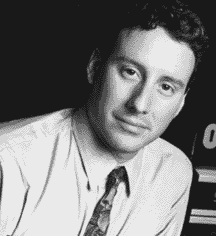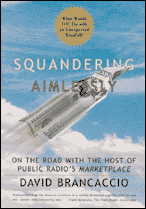
 If you traveled across the country talking with people from all walks of life who had in common the sole characteristic of having recently received a sizable financial windfall, what do you think you might have learned by the time you were through? If you traveled across the country talking with people from all walks of life who had in common the sole characteristic of having recently received a sizable financial windfall, what do you think you might have learned by the time you were through?
If you were David Brancaccio, host of public radio's "Marketplace" and author of Squandering Aimlessly, a book that describes just such a journey, then your answer may be: "Do nothing, at least at first."
"Ultimately, my book is about prudence, saving for a rainy day, and, above all, don't feel the need to act on money immediately," says Brancaccio. "That's the thing that so many people screw up." He calls this anxiety the "lottery winner's mistake."
As host of an award-winning financial news radio program, Brancaccio has met and talked with potentates such as former US Treasury Secretary Robert Rubin and legendary Bear Stearns chairman Ace Greenberg. But it seems like some of the more powerful lessons on life and money might have been learned during his sojourn into the dark heart of American spending and saving.
"Typically, people are smart enough -- at least after the initial, %91Oh, if my ship ever comes in, I'll know exactly what to do' -- to say: %91Wait a minute. Applying my values to that money is the one thing a financial advisor can't do for me,' " Brancaccio notes. He likens this epiphany to asset allocation in a financial portfolio, suggesting that people often do best by just sitting down and divvying up the money. Giving to charity, buying time off from work to spend more time with family, and upgrading investments are just some of the ways people may choose to spend a windfall. But unless you stop and -- literally -- make a list, the arrival of a financial windfall is likely to be overwhelming.
But what he found interesting was the initial reaction people had when he presented the notion of a windfall as a problem. Invariably, people seemed to think (at least at first) that everything would fall into place because money "knows what to do with itself."
The title of this, his first book, is a bit ironic, Brancaccio admits. "Ultimately, I hope I'm arguing for prudence, for being deliberate in your money choices," he notes. And, true, Brancaccio makes a point of summing up the "life lessons" learned at the end of each chapter of Squandering Aimlessly. After his nearly hallucinogenic trip to the Mall of America (which he calls "the eighth wonder of the world"), he pledges to stow away his credit card in the same out-of-the-way place where he keeps his passport. Fresh from a visit to Hawthorne, NV -- a town trying to overcome an economic downturn by winning a national contest for "civic virtue" -- Brancaccio promises to give charity a higher priority in virtually every personal finance decision he makes. AFTER THE FALL Squandering Aimlessly was originally released in hardcover in February 2000, just as the market began to collapse upon itself; the trade paperback version came out a year later. The timing of the trade paperback release, a year after the market correction, is not at all lost on Brancaccio. Given the burst of the stock market bubble in 2000, he says he has asked himself why should anyone give a rat's derriere about what to do with extra piles of now-nonexistent cash or squandering any kind of windfall during a time of belt-tightening, a slowing economy, and rising layoffs. He comments that the decisions about what to do with money become all the more crucial in times of, if not economic difficulty, then at least what Brancaccio calls "more measured emotions." "These are times," he says, "when we have to account for our money with a greater degree of precision. I think sometimes we all lose sight of the fact that what might seem like a chump-change chunk of money is actually very significant to people and can spark the sort of questions that I went around the country asking people about."
David Brancaccio's Squandering Aimlessly is in many ways an extension of the work he has always done as a journalist. A broadcast journalist before he was old enough to drive a car, Brancaccio has worked as a newscaster and reporter for radio stations from San Francisco to Washington, DC. He has covered Europe's path to political and economic integration, the battles between British truck drivers and French farmers over British meat prices, and the effect of the Bank of Credit and Commerce International (BCCI) scandal on Asian businesses operating in the UK. He has been the host of "Marketplace" -- better known as "public radio's business program for the rest of us" -- for the past seven years. Brancaccio served as the London bureau chief for "Marketplace" for three years before becoming its host in 1993.
"Why should public broadcasting do a business program?" was an attitude that Brancaccio and "Marketplace" encountered in the late 1980s when the program first began. CBS once produced a financial program for public radio before "Marketplace"came on the scene; the CBS program was journalistically sound, Brancaccio recalls, but was a bit of the "agate-type version of business news," he says, hinting at the distinguished (read: stuffy) tone used by many financial and business newspapers.
"There was some resistance within public radio [to the concept]," Brancaccio says, resistance that meant it would be necessary to reinterpret the concept of "business news." The reinterpretation? In a nutshell, "If you take a staff in which no one has a master's degree in business administration, no MBAs in sight ... but stick them on the business beat as if they were anthropologists ... then you have something that sits better within the ethos of public radio."
"For my constituency ... it has to be extremely accessible, and for every story about saving $50,000 a year in taxes, you have to have five stories that say 'this is the effect on the lower fifth [of taxpayers].' " WHAT DO PEOPLE WANT TO LEARN? "Marketplace" also "casts a wider net" than the average financial news program, covering the stock market but also workplace issues and glass ceiling issues. The program recently featured a Valentine's Day interview with a matrimonial law expert talking about prenuptial agreements for Generation X-ers. (Why Gen X-ers? As the expert put it, "Debt, darling.")
Two other factors also helped propel "Marketplace." One was the fall of the Berlin Wall and the subsequent collapse of communism, which shifted the discussion from capitalism versus socialism to free trade versus "fair trade" -- a debate that "Marketplace," with its public radio audience, was in a unique position to present. The second big factor was (and remains) what Brancaccio calls "the democratization of personal finance."
"You can't reverse the clock on one thing," he sums up. "You can reverse the clock on daytrading; daytrading is a self-correcting problem. But you can't reverse the clock on the trend of taking responsibility for your own finances." David Penn can be reached at DPenn@Traders.com. REFERENCE Brancaccio, David [2000]. Squandering Aimlessly, Simon & Schuster.
Copyright © 2001 Technical Analysis, Inc. All rights reserved.
|




 If you traveled across the country talking with people from all walks of life who had in common the sole characteristic of having recently received a sizable financial windfall, what do you think you might have learned by the time you were through?
If you traveled across the country talking with people from all walks of life who had in common the sole characteristic of having recently received a sizable financial windfall, what do you think you might have learned by the time you were through?